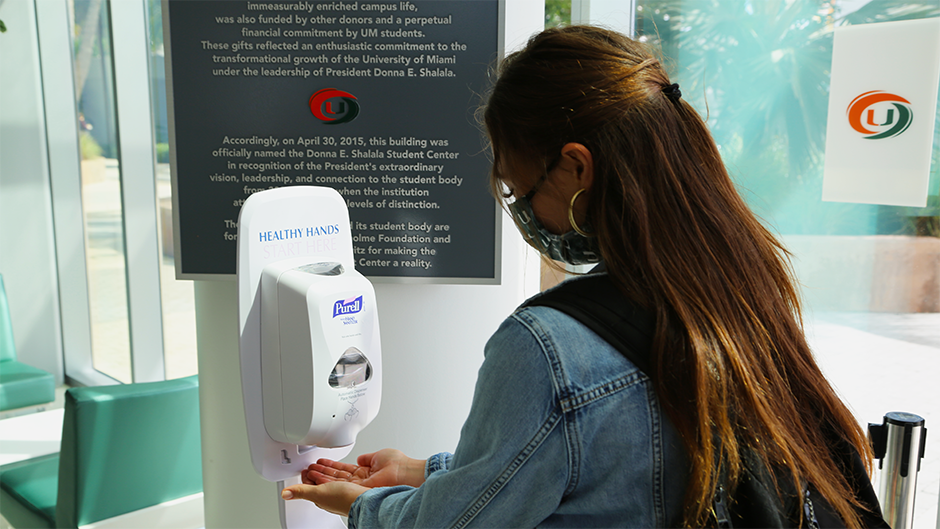From the reconfiguration of the Herbert Wellness Center and educational programs about sexual health to continued online counseling services and personalized support for students in quarantine, the Division of Student Affairs' Healthy 'Cane Network ensured students had access to vital resources throughout this challenging academic year.
A collaboration among the Department of Wellness and Recreation, the University’s Counseling Center, Housing and Residential Life, Student Health Service, and the Sandler Center for Alcohol and Other Drug Education, the HCN explores student well-being through three categories: healthy behaviors, healthy body, and healthy mind.
By offering inter-network referrals, individualized student support, campus events and programs, and peer-driven health education campaigns, the network embodies the multi-faceted nature of well-being.
“The Healthy 'Cane Network is an exemplary model for campus collaboration,” said Patricia A. Whitely, senior vice president for student affairs. “It is so important that we acknowledge the many dimensions of well-being and ensure that our campus programs and services are offered in a collaborative and supportive way for students.”
Anthony Musto, director of fitness programs for the Department of Wellness and Recreation, says the hurdles of transforming the center’s many in-person programs and services to conform with social distancing guidelines and the interest in offering new events to students invited the staff to think differently about how to serve students.
“We had to be creative and figure out how we could still offer our fitness and wellness services while also meeting these guidelines,” he said.
By transforming the layout of the 140,000-square-foot facility, enforcing face coverings, and implementing more intense cleaning protocols, students could safely enjoy the activities of the Herbert Wellness Center throughout the academic year. To honor its commitment to provide fitness programs year-round, indoor fitness classes that were unable to be held indoors were moved to outdoor spaces across campus.
Combined with its ongoing offerings, the department's adaptations to COVID-19 earned the University a gold distinction by the American College of Sports Medicine’s “Exercise is Medicine ” initiative. The University was one of only 73 institutions to receive the highest-level award, granted to colleges and universities that provided an extraordinary culture of wellness this year.
Similarly, the University’s Counseling Center transformed its traditional in-person services to digital platforms as the need to support student’s mental health was prioritized throughout the semester.
“Despite major challenges, it’s been a successful transition to providing virtual services,” said Rene Monteagudo, director of counseling. “The feedback that we’ve gotten from students is that they have deeply appreciated that we’ve been able to continue to see them during the pandemic.”
As group programs, psychiatry services, and individual counseling moved online, these telehealth offerings became a staple for the center to continue seamlessly delivering their vital services—especially for students who studied remotely this year. The center urges those struggling with mental health to use additional self-help apps such as WellTrack to track daily symptoms and practice relaxation techniques.
Jessica Stinnett, case manager for Housing and Residential Life, also reached out to student residents in need of support. This year, her involvement with residents placed in isolation or quarantine created a helpline for students and allowed HRL to check in with students and address the unique stressors of this semester.
“We make sure there is a lot of outreach available to students and then ensure they are relayed to other resources that may benefit them,” said Stinnett.
In addition to providing resources within her department to residents, Stinnett also referred students to other outlets on campus—whether it be the Dean of Students Office, Counseling Center, or Student Health Service.
“A goal of the network is to understand that there is not only one aspect of wellness,” adds Stinnett, regarding the collaborative nature of the HCN.
Although COVID-19 dominated much of the campus conversation this year, the importance of other health topics on campus remained high. Rachel Askowitz, health educator at the Student Health Service, worked with her student team to develop health initiatives on campus to educate students about important topics, focusing on sexual health.
“My team and I try to educate students about COVID-19, of course, but not to forget these other important health topics,” she said. “So, we continued to do programming about other health topics in addition to sharing health messages about COVID.
For example, Student Health Service hosted the first-ever Sexual Health Month in February. The program took an exclusively virtual format and focused on various sexual health topics including safe sex supplies, sex positivity, and dating app safety. Similarly, the Sander Center's peer educators continued to engage students in important conversations surrounding drugs and alcohol.
Visit miami.edu/hcn to learn more about the Healthy 'Cane Network.

